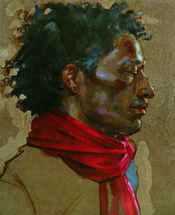Character and Contradiction in "A & P" At first glance, John Updike's Sammy, in "A&P," is just a typical teenaged boy working in a grocery store: smart-mouthed and slightly rebellious, with judgment easily swayed by the sex appeal of a pretty girl. But when he lurches into a new seriousness, suddenly quitting his job after his manager (unjustly, he thinks) scolds the three girls for coming into the A&P in swimsuits (with the straps down), we consider him further, to look a little closer to see what he's made of. Such closer analysis reveals that, in fact, he's a round character, not a typical one, because Updike not only shows several of Sammy's traits, but also shows several sides of him. That is, Updike gives him complexity and depth by giving him traits that are contradictory but plausible. Sammy is sexist but sensitive, rebellious but conforming, and irresponsible but responsible in a larger sense.
First Updike portrays Sammy as sexist. He's sexist in that he seems unable to see women as people, consistently perceiving them as objects or stereotypes. We see his sexism primarily in his girl-watching as he lusts after a "sweet broad soft-looking can" (13) and longs after bare shoulders revealed by swimsuit straps that are down. We see it as he leans over his cash register to get another glimpse of flesh. The girls exist as a composite of their attractive features rather than as human beings. We see sexism in the derogatory terms he uses to refer to female customers: "witch" (13), "house slaves," and "sheep" (14). The primary difference between his normal customers and the girls is that the normal customers aren't attractive; consequently, he focuses on personality features or stereotypes, avoiding the need to see them as complete people. His ultimate condemnation of...


